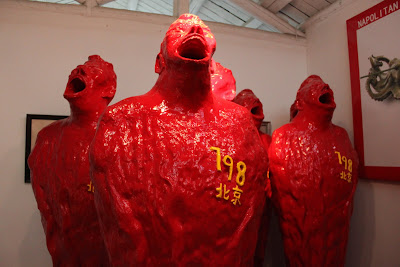I'll be live-blogging Marbury's first game in the Chinese Basketball Association (CBA) from press row, starting now. Updates will go at bottom.
Shanxi Zhongyu vs. Dongguan Leopards, 7:30 p.m. local time tipoff.
Expecting a packed house today.
 6:50 p.m.: If there was any need for proof that Marbury is in the lineup, see the scoreboard, right.
6:50 p.m.: If there was any need for proof that Marbury is in the lineup, see the scoreboard, right.6:55 p.m.: Stephon Marbury just took the court. There was the expected roar, but the stands are anything from packed, so it wasn't anything close to what I'm expecting when he's actually announced.
Going to be a tough game for Dongguan. Whatever the spread is, take the home team.
7:07: PA reverb. Ow.
7:22 p.m.: Under seven minutes until national anthem. Players just left the court. When I come back next the game will have started (CCTV5, or Zhibo8), and I'll have pictures for you.
8:46 p.m.: The pictures will have to wait. Too much happening, and too fast. Halftime seemed to fly by.
Marbury just converted an and-1 (at the 4:17 mark) and has taken a seat for a breather. It is knotted at 76 with 3:10 remaining. (Time is running as I type -- the beauty of the live blog.)
The PA announcer recently said, "Everyone please sit down, please sit down, there're lots of people today, please sit down."
One thing I won't understand about sports in China: the insistence on remaining seated. But, as the PA announcer also pointed out, "let's distract the opposing free throw shooter!"
8:47 p.m.: Marbury is playing decent. I don't think he has a turnover, and if so, not more than one. But his jump shot has been failing him tonight. What I'd love to see out of him -- speaking strictly from a sports perspective -- is more drives to the basket. He's had no fewer than four layups, and I think maybe as many as six. His and-1 was a twirling, over-the-head shot with body contact, the sort of shot that NBA players are capable of making 80 percent of the time but is somewhat of a spectacle here.
The Dongguan point guard, Tre Kelly, whom I interviewed earlier today for, is driving hard at Marbury, and the two of them are really going at it. They're both in right now.
8:51: Marbury just stole the ball, dribbled behind his back, scoop passed it to the trailer and asked for a foul when it wasn't called. Then the coach asked for it, and the fans...
Well, what's obvious to me is that Shanxi is a better team with Marbury running the point. He's been trying to get others involved, and I'm thinking after tonight -- or Wednesday -- he's going to try creating more for himself.
And by the way, I couldn't post anything all of the first half because I couldn't find a place to place my laptop. This building is packed. Not one empty seat in the arena, and I mean it.
I'm working currently from the ledge of the media podium. My legs are getting tired.
9:00 p.m.: Crowd getting into it. Taylor (other American player on Shanxi) just waved in front of ref's face, as if to say, "You're not seeing anything." Ref twirled around sternly, as if to T him up. The crowd started chanting something like, "Blow the whistle." Later a fan said, "Better get on the bus fast afterwards!"
9:01 p.m.: Refs miss an OBVIOUS call. Ball had hit rim, they didn't see it, called 24-second violation.
9:02 p.m.: "Hey ref, you better watch out!"
9:03 p.m.: Wow. Lighters are RAINING from the stands. PA announcer doing his best to keep order. I think I saw Marbury smirk.
Video later.
They were chanting "heishao," not "chuishao." Black whistle. Accusing the refs of being bought out.
In China, this is not a light accusation, but I bet the chant happens all the time.
9:12: 94-92 Dongguan with 4 minutes left.
By the way, this game is NOT on CCTV5, as I'd assumed. Is the government in on the fix???
9:21: Hotly contested contest. 99-98 home team with 1:18 left. Camera battery running low!
9:39 p.m.: So, down by one with five seconds left and inbounding from halfcourt, who do you think gets the ball?
The defense knew it too, and when they collapsed on Marbury he passed it out back up to the three-point line, where Taylor's shot hit the front rim, backboard, and may have chipped the rim again. Final score: 101-100, Dongguan.
Afterwards fans popped their thunderstix in succession/unison, creating noises that sounded like firecrackers. It seems even more like that when you consider the fans have lit up cigarettes. Nothing thrown though.
As I type a fan is running into the stands trying to start a fight, about 20 meters down.
Pictures to come.


































